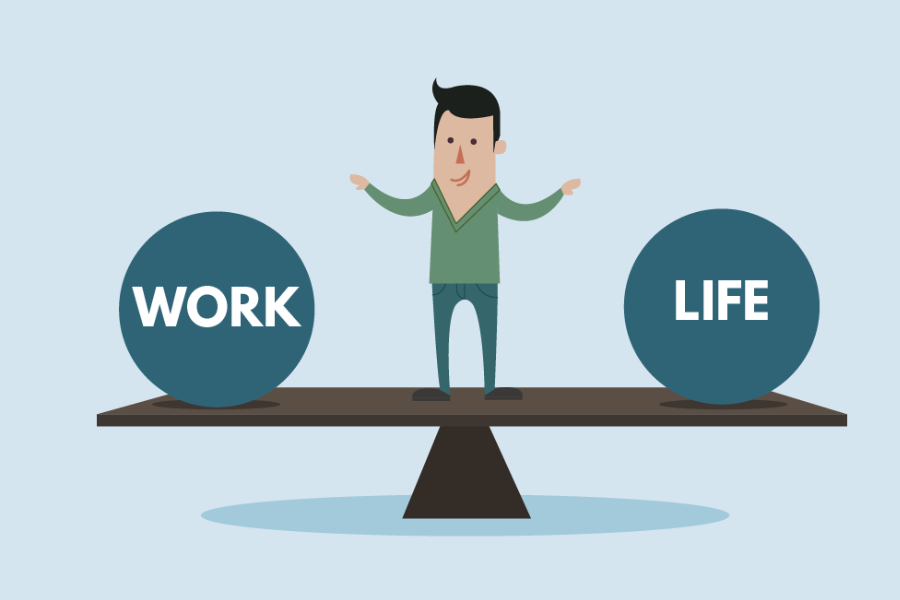Introduction
In today’s fast-paced world, maintaining productivity while balancing personal life can feel overwhelming. With constant distractions, endless to-do lists, and the pressure to achieve more, it’s easy to burn out. However, success isn’t about working harder—it’s about working smarter.
This guide will walk you through practical strategies to help you stay productive, manage time effectively, and maintain a healthy work-life balance. From setting priorities to practicing self-care, you’ll discover how small changes can lead to big results.
Let’s dive into the secrets of achieving peak productivity without sacrificing well-being.
The Connection Between Productivity and Work-Life Balance
Many people believe that being productive means working long hours and constantly pushing themselves. However, true productivity comes from managing energy efficiently. When you overwork, stress levels rise, motivation declines, and burnout becomes inevitable.
A balanced approach ensures that you stay motivated, creative, and mentally sharp. By setting clear boundaries, prioritizing effectively, and taking care of your well-being, you can accomplish more in less time while enjoying life outside of work.
Understanding Time Management and Its Impact on Productivity
Time management is a crucial factor in achieving high levels of productivity. When you allocate time wisely, you can focus on what truly matters instead of getting caught up in distractions.
One of the most effective methods is time blocking, where you dedicate specific hours to certain tasks. This technique minimizes decision fatigue and increases efficiency. Another approach is the Pomodoro Technique, where you work in focused intervals (usually 25 minutes) followed by short breaks. This method enhances concentration and prevents mental fatigue.
By mastering time management, you gain control over your schedule, reduce procrastination, and accomplish tasks without feeling overwhelmed.
The Role of Self-Care in Maintaining High Performance
Many people overlook self-care, thinking it’s a luxury rather than a necessity. However, taking care of yourself directly impacts productivity. Proper rest, hydration, and mental relaxation contribute to improved focus and efficiency.
Importance of Sleep
Lack of sleep leads to decreased concentration, memory problems, and reduced problem-solving skills. Experts recommend at least 7-9 hours of sleep for optimal cognitive function. Establishing a bedtime routine and reducing screen time before bed can improve sleep quality.
Nutrition and Hydration
Eating well-balanced meals and staying hydrated provide your brain with the fuel it needs to function efficiently. A diet rich in protein, healthy fats, and complex carbohydrates helps maintain energy levels throughout the day.
Stress Management
Chronic stress leads to burnout and reduces overall productivity. Engaging in activities such as meditation, yoga, or simple breathing exercises can help lower stress levels. Practicing mindfulness ensures that you stay present and focused on the task at hand.
Eliminating Distractions for Maximum Focus
Distractions are the biggest productivity killers. Whether it’s social media, constant notifications, or background noise, minimizing distractions is key to staying focused.
One effective method is the “Do Not Disturb” mode, which silences notifications during work hours. Additionally, setting up a dedicated workspace free from clutter and interruptions helps improve concentration.
Another tip is to schedule specific times for checking emails and social media instead of constantly switching between tasks. This reduces mental clutter and improves efficiency.
How to Set Goals and Stay Motivated
Without clear goals, it’s easy to feel lost and unmotivated. Setting SMART (Specific, Measurable, Achievable, Relevant, Time-bound) goals provides a clear direction and helps track progress.
Visualization techniques, such as creating vision boards or writing down goals, reinforce motivation. Breaking large tasks into smaller, manageable steps also prevents overwhelm and ensures steady progress.
Additionally, celebrating small wins boosts confidence and maintains momentum. Recognizing achievements keeps you motivated and engaged in your work.
The Science Behind Habits and Long-Term Success
Productivity isn’t just about short-term efficiency—it’s about building sustainable habits that lead to long-term success. Research shows that habits form through cue, routine, and reward cycles. By understanding this pattern, you can replace bad habits with positive ones.
For example, if checking social media first thing in the morning reduces productivity, replacing it with a 5-minute journaling session or reading a motivational quote can set a more productive tone for the day.
Consistency is key when forming new habits. The more frequently an action is repeated, the more ingrained it becomes. Over time, these small habits compound, leading to massive improvements in performance and success.
Overcoming Procrastination and Staying Disciplined
Procrastination is one of the biggest obstacles to productivity. It often stems from fear, lack of motivation, or feeling overwhelmed by tasks.
One effective strategy is the “Two-Minute Rule,” which suggests that if a task takes less than two minutes to complete, do it immediately. This prevents small tasks from piling up and becoming overwhelming.
Another method is the “Five-Minute Start”—committing to just five minutes of work on a daunting task. Often, once you start, it becomes easier to continue.
Creating accountability systems, such as setting deadlines or having a productivity partner, also helps maintain discipline. Knowing that someone else is tracking your progress can be a powerful motivator.
Work Smarter, Not Harder: Automation and Delegation
Many people assume that working longer hours leads to higher productivity, but this isn’t always true. Smart professionals leverage automation and delegation to streamline tasks and save time.
Automation Tools
Using productivity apps like Trello, Notion, or Asana helps organize tasks and track progress. Email filters and autoresponders reduce time spent on unnecessary communication. Calendar scheduling tools eliminate back-and-forth emails for setting meetings.
Delegation
Understanding that you don’t have to do everything yourself is crucial. Delegating tasks to colleagues, freelancers, or virtual assistants allows you to focus on high-impact work while ensuring everything gets done efficiently.
How to Maintain Work-Life Balance in a Fast-Paced World
Achieving work-life balance requires setting boundaries and prioritizing personal time.
One of the best ways to maintain balance is by defining clear work hours and avoiding work outside of those times. Creating a morning and evening routine ensures that work doesn’t dominate your entire day.
Spending quality time with family and engaging in hobbies outside of work is equally important. Whether it’s exercising, reading, or traveling, these activities refresh the mind and prevent burnout.
The Role of Continuous Learning in Professional Growth
Lifelong learning is essential for staying competitive and adaptable in an ever-changing world. Successful individuals prioritize personal development by reading books, taking online courses, and attending industry events.
Networking with like-minded professionals also opens doors to new opportunities and fresh perspectives. Engaging in discussions, joining mentorship programs, and seeking feedback contribute to ongoing growth and improvement.
More About: Financial Updates AGGR8Finance – The Future of Personal Finance Solutions
Conclusion
Achieving productivity and work-life balance isn’t about working non-stop—it’s about working smarter. By implementing effective time management strategies, eliminating distractions, and prioritizing self-care, you can enhance your efficiency while maintaining a fulfilling personal life. Small changes, such as goal-setting, automation, and forming positive habits, can lead to long-term success.
At someboringsite.com, we believe that productivity should never come at the cost of well-being. Whether you’re an entrepreneur, a busy professional, or someone looking to improve daily efficiency, these strategies will help you stay focused, motivated, and stress-free. Start applying these principles today and experience the transformation for yourself!
FAQs
1. How can I stay productive without feeling overwhelmed?
Break tasks into smaller steps, use time-blocking techniques, and take regular breaks. Prioritizing tasks and avoiding multitasking can also help reduce stress.
2. What is the best way to manage time effectively?
Use productivity methods like the Pomodoro Technique, Eisenhower Matrix, and digital tools such as Notion or Trello to organize tasks efficiently.
3. How does self-care improve productivity?
Proper sleep, healthy eating, hydration, and stress management improve focus, energy levels, and overall efficiency, preventing burnout.
4. Can automation tools really boost productivity?
Yes! Tools like Asana, Zapier, and Calendly help streamline tasks, reduce manual work, and free up time for more important activities.
5. What’s the key to maintaining work-life balance?
Set clear boundaries between work and personal life, schedule downtime, and engage in activities that refresh your mind and body.

